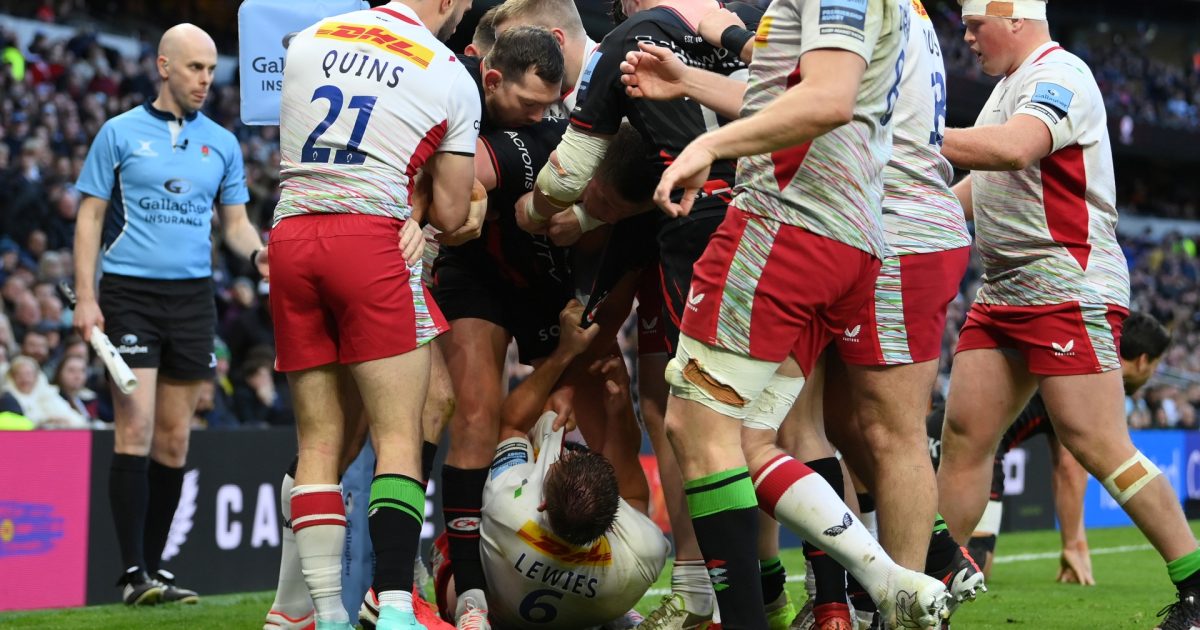RFU statement: TMO reaction to alleged foul play against Owen Farrell

The RFU have moved to end the debate over last Saturday’s decision in the Gallagher Premiership not to review alleged foul play by Harlequins’ Stephen Lewies against Saracens’ Owen Farrell.
Ex-England scrum-half Austin Healey spotted a clear-out by Lewies while working as a co-commentator for TNT Sports at the top-flight match which was held at Tottenham.
The alleged clear-out saw Harlequins captain Lewies, who had earlier been given a first-half yellow card, slide on his knees into Saracens skipper Farrell.
Rather than review the incident after the play had stopped with Saracens scoring a try through Juan Martin Gonzalez, TMO Stuart Terheege was heard telling the referee Christophe Ridley he did not want to explore the matter because Healey had spotted it.
This audio ignited debate and an RFU statement investigating what happened read: “The professional game match officials team (PGMOT) regret that questions have been raised about player safety and decision-making. Match officials take player welfare incredibly seriously and it is their overriding priority.
“At the time of the Gonzalez try, the television match official (TMO) Stuart Terheege asked the TNT Sports director for clips around the incident to review in the background before deciding whether to call an official review into the foul play incident or not.
“This is a common request from TMO to director that occurs in rugby broadcasting to enable the TMO to decide whether an official review is required. Simultaneously, the TMO also checked the grounding on the Saracens try.
“In relation to the act of foul play committed by Stephen Lewies against Owen Farrell, the TMO saw the initial contact off the ball. He decided on the evidence that it was no more than a penalty advantage. As Saracens went onto score, that advantage was deemed to have been taken, so no further action was required.
“In response to Stuart’s initial request for images the director asked the TMO if he wanted to look again at the incident. The TMO declined, as he was confident in his original decision. At the same time, the TNT Sports commentary team also saw the replays and posed the question whether Lewies’ actions warranted a review.
“TNT Sports’ audio directors can cut to the TMO if there is a moment when viewers would benefit from their insight in their decision-making. At this juncture, some of the conversation between the TMO and match director with regards to the replays requested and whether an official review was needed were broadcast ‘live’.
“The conversation between TMO and director that was broadcast ‘live’ was regrettable, they were not intended to be heard outside of the broadcast truck nor were they the reason for the foul play incident not being formally reviewed. Terheege is disappointed that he allowed himself to be distracted with interactions with the broadcast team and did not communicate his decision to the on-field match officials.
“TMOs do not actively listen or react to the broadcast commentary team. TMOs make their decisions independently, based on their own judgement, experience, and in line with agreed World Rugby protocols. However, due to their location at the matches, they sometimes overhear commentary. The nature of the audio configuration in some broadcast trucks and in some stadiums means the working environment varies from match to match.
“The incident was an unusual and unfortunate occurrence. The PGMOT, Premiership Rugby and TNT Sports are working closely together to make sure this does not happen again. The three organisations enjoy a close and positive working relationship based on a mutually beneficial system that has worked for many years. All parties will continue to work hard to further refine and perfect systems to ensure player safety and high-quality rugby.”
2️⃣5️⃣0️⃣ @Saracens appearances for one of the greats 🙌
The one and only, Owen Farrell 🌟#GallagherPrem | #TheShowdown4 pic.twitter.com/RBcXgkcjA9
— Rugby on TNT Sports (@rugbyontnt) March 23, 2024












































































